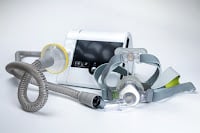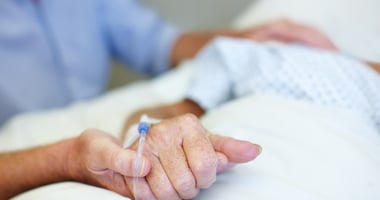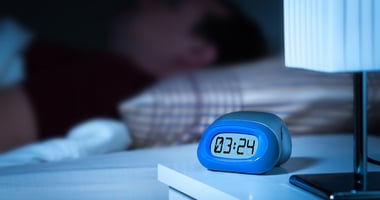Obstructive sleep apnea (OSA), a condition in which the soft tissues of the throat relax and narrow...
Diabetes Medication Shows Promise at Reducing Sleep Apnea Severity

The antidiabetic tirzepatide reduces the frequency of breathing interruptions and other sleep-related symptoms in adults with obstructive sleep apnea (OSA), according to findings from two placebo-controlled clinical trials published today in the New England Journal of Medicine. Adults who took tirzepatide also exhibited reductions in risk factors associated with sleep apnea like body weight and blood pressure compared with those who took placebo.
“Historically, treating OSA meant using devices during sleep, like a CPAP [continuous positive airway pressure] machine, to alleviate breathing difficulties and symptoms,” said lead investigator Atul Malhotra, M.D., of the University of California, San Diego, in a press release. “However, its effectiveness relies on consistent use. This new drug treatment offers a more accessible alternative for individuals who cannot tolerate or adhere to existing therapies.”
Malhotra and colleagues enrolled 469 adults diagnosed with clinical obesity and moderate-to-severe OSA; the participants were equally divided into two groups: Group one consisted of those who were not using CPAP devices to manage their sleep apnea and group two consisted of those who were.
In each CPAP group, the participants were randomly assigned to a subcutaneous injection of 10-15 mg of tirzepatide or a placebo weekly for 52 weeks. At the end of one year, the investigators assessed the change in participants’ apnea–hypopnea index (AHI, the number of breathing pauses per hour of sleep) relative to baseline. Other symptoms assessed included hypoxic burden (percentage decrease in blood oxygen levels), patient-reported sleep impairment, body weight, and systolic blood pressure.
At baseline, the participants had an average AHI of around 50 events an hour. After 52 weeks, the AHI among adults in group one who took tirzepatide dropped by 25.3 events an hour versus 5.3 events an hour in the placebo group. Among adults in group two, AHI dropped by 29.3 events an hour versus 5.5 events an hour in the placebo group. In addition, the participants taking tirzepatide lost around 18% (group one) and 20% (group two) of their baseline body weight and had greater improvements than the placebo group for all other sleep and metabolic symptoms assessed.
The most common tirzepatide-associated side effects were gastrointestinal issues such as diarrhea, nausea, or vomiting; 7.5% of the participants reported serious adverse events, with similar rates in the tirzepatide and placebo groups.
In an accompanying NEJM editorial, Sanjay R. Patel, M.D., of the University of Pittsburgh said these study findings were promising but noted that whether “tirzepatide improves patient-centered outcomes in obstructive sleep apnea remains unclear because a change in the AHI has not been validated as a surrogate marker of clinically relevant end points.” Though patient-reported sleep impairment also improved with tirzepatide, Patel said important outcomes like daytime sleepiness and overall functioning need to be assessed.
These trials were funded by Eli Lilly, manufacturer of tirzepatide; Malhotra is a consultant for Eli Lilly.
(Image: Getty Images/iStock/Askolds)






